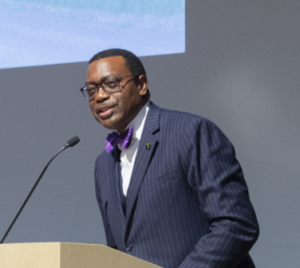The President of African Development Bank Group (AfDB), Dr. Akinwumi Adesina, has said that Nigeria is losing about $29 billion dollars annually, representing about 5.8% of the nation’s annual Gross Domestic Product (GDP) due to a lack of reliable power supply.
The development finance banker made this remark while delivering his lecture on “Building a Global Nigeria” to commemorate the 90th birthday anniversary of a former military Head of State, Gen. Yakubu Gowon (rtd) in Abuja.
According to him, one of the major challenges Nigerian manufacturers had been facing was the high cost and unreliability of electricity supply.
Adesina noted that load shedding and the inconsistent availability of electricity had resulted in high and incompetitive manufacturing costs, thereby compelling business owners to be sourcing for alternative power through dependence on generators.
He explained: “It has been estimated by the IMF that Nigeria loses about 29 billion dollars annually, that is, 5.8 per cent of its GDP, due to a lack of reliable power supply.
“The report also indicates that Nigerians spend $14 billion dollars yearly on generators and fuel. There is no other way to say it, lack of electricity is killing Nigerian industries”, he added.
Citing data from the Manufacturers Association of Nigeria (MAN), which indicated that industries spent N93.1 billion on alternative energy in 2018, the AfDB boss lamented that now no business can survive in Nigeria without generators.
He pointed out though Nigeria had gas and crude oil in abundance, which can be vital means of generating electricity, about 86 million Nigerians live daily without electricity, adding that “today, Nigeria is the number one country in the world in terms of the total number of people without electricity.”
While noting that the ugly power situation requires urgent attention by the governments in order to boost the country’s economy, Adesina maintained that to achieve the dream of a “global Nigeria”, the country must achieve universal access to electricity.
Speaking on how the AfDB had been supporting Nigeria in power sector over the past few years, he said that the bank had hugely invested in the power sector to support the implementation of Nigeria’s Power Sector Recovery Programme by providing $200 million for the Nigeria Electrification Project.
The AfDB President expatiated: “To support Nigeria and other African countries, the AfDB invests massively in the continent’s power sector.
“This is through provision of 200 million dollars for the Nigeria Electrification Project, which is designed to fill the country’s electricity access gap.
“We have also invested 210 million dollars in the Nigeria Transmission Project to strengthen the grid power evacuation and regional interconnection”, he added.
Adesina said that a major component of AfDB’s energy strategy was the launch of the Desert to Power initiative, a $20 billion initiative designed to provide electricity for 250 million people across 11 countries of the Sahel, including Northern Nigeria, and also expected to create the world’s largest solar zone.
He clarified: “This initiative will draw lessons from successful projects already financed by the bank, including the Noor Ouarzazate solar PV power project in Morocco, and the Ben Ban solar project in Egypt.
“The President of the World Bank Group, Ajay Banga and I made the decision that the two institutions will work together to connect 300 million Africans, including Nigerians, to electricity by 2030”, the AfDB boss projected.






